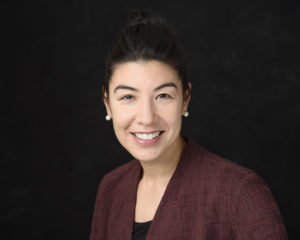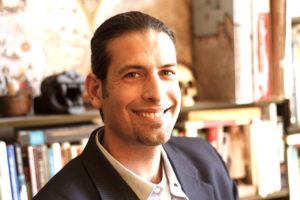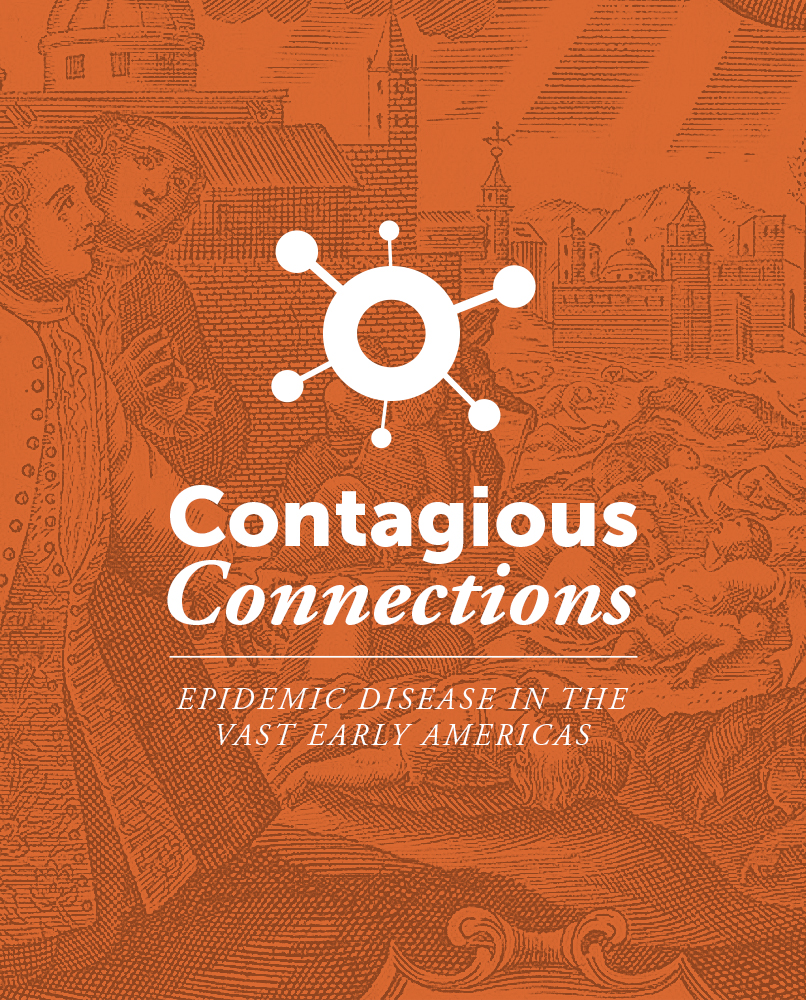Contagious Connections, session 2
Co-chaired by Ryan Kashnanipour (University of Arizona) and Claire Gherini (Fordham University), “Contagious Connections” looks at epidemics and disease in Vast Early America.
Epidemics were a foundational force in the early history of the Americas and the larger Atlantic World. Yet their interdisciplinary and comparative analysis has often been restricted by the imperial and temporal priorities of these regions’ subfields as well as older biomedical and demographic approaches to the study of disease. Rather than rehashing whether acquired immunity destined Native Americans to extirpation and Africans for slavery in the Americas, this series proceeds from the idea that epidemics are epistemological and ontological forces: they have a historical materiality but become epidemics of a particular disease when historical actors collectively decide to name and treat them as such.
Join the Omohundro Institute for a pair of (online) conversations with established scholars about these topics on Friday, December 3, 2021, from 11:30 am to 1:00 pm ET and Friday, December 17, 2021, from 12:30 to 2:00 pm ET.
The December 3 program will include Pablo Gomez, Paul Kelton, Mark Goldberg, Martha Few, Erik Seeman, and Philippa Koch.
The December 17 program will include Erica Charters, James Rice, Cristobal Silva, Rana Hogarth, and Seth Archer.
About the December 17 panel

Erica Charters is a historian of disease, war, and empires. She is associate professor of Global History and the History of Medicine at the University of Oxford, where she is also Director of Oxford’s Centre for the History of Science, Medicine, and Technology, and co-Director of Oxford’s Centre for Global History. She has published on the history of colonial medicine as well as the history of imperial war and its relationship to disease. Her publications include the monograph Disease, War, and the Imperial State and a spotlight journal issue on the history of epidemics in the context of COVID-19. She is currently coordinating a multi-disciplinary project on ‘How epidemics end’.
 James Rice is the Walter S. Dickson Professor of History and chair of the History Department at Tufts University. His publications include Nature and History in the Potomac Country: From Hunter-Gatherers to the Age of Jefferson (John Hopkins University Press, 2009), Tales from a Revolution: Bacon’s Rebellion and the Transformation of Early America (Oxford University Press, 2012), and “Bacon’s Rebellion in Indian Country” (winner of the Binkley-Stephenson Award for the best article published in the Journal of American History in 2014). He is currently working on two books: Founding Massacres: Violence, Ambition, and the Birth of Virginia, and Native America: An Environmental History (under contract with the Cambridge University Press).
James Rice is the Walter S. Dickson Professor of History and chair of the History Department at Tufts University. His publications include Nature and History in the Potomac Country: From Hunter-Gatherers to the Age of Jefferson (John Hopkins University Press, 2009), Tales from a Revolution: Bacon’s Rebellion and the Transformation of Early America (Oxford University Press, 2012), and “Bacon’s Rebellion in Indian Country” (winner of the Binkley-Stephenson Award for the best article published in the Journal of American History in 2014). He is currently working on two books: Founding Massacres: Violence, Ambition, and the Birth of Virginia, and Native America: An Environmental History (under contract with the Cambridge University Press).
Cristobal Silva is an associate professor in the Department of English at UCLA, where he specializes in the Literatures of the Colonial Americas. He is the author of Miraculous Plagues: An Epidemiology of Early New England Narrative (Oxford, 2011), which explores the relation between colonial epidemiology and the stories of colonial belonging that English settlers told themselves. He is currently finishing a manuscript titled Republic of Medicine, a study of immunology, medical knowledge, and the eighteenth-century Atlantic slave trade.

Rana Hogarth is associate professor of history at the University of Illinois at Urbana Champaign. Her research focuses on the creation of ideas about racial difference in North America and the Caribbean as they emerged through the language of medicine and its allied fields. She is the author of Medicalizing Blackness: Making Racial Difference in the Atlantic World, 1780-1840 (University of North Carolina Press, 2017), which examines how white physicians defined blackness as a medically significant marker of difference in slave societies of the American Atlantic. Her other publications appear in Social History of Medicine, American Quarterly, African and Black Diaspora: An International Journal, the American Journal of Public Health and in the edited volume Medicine and Healing in the Age of Slavery, edited by Sean Morey Smith and Christopher Willoughby (LSU Press, 2021).
 Seth Archer is an assistant professor at Utah State University. He is a cultural and environmental historian of North America specializing in Native American and Indigenous history and the history of health, disease, and medicine. His first book is Sharks upon the Land: Colonialism, Indigenous Health, and Culture in Hawaiʻi, 1778–1855, which won the President’s Book Award from the Social Science History Association. From 2015 to 2017 he was the Mellon Research Fellow in American History at the University of Cambridge. His current research involves vaccination efforts by the US government and Hudson’s Bay Company in Indian Country in the 1830s.
Seth Archer is an assistant professor at Utah State University. He is a cultural and environmental historian of North America specializing in Native American and Indigenous history and the history of health, disease, and medicine. His first book is Sharks upon the Land: Colonialism, Indigenous Health, and Culture in Hawaiʻi, 1778–1855, which won the President’s Book Award from the Social Science History Association. From 2015 to 2017 he was the Mellon Research Fellow in American History at the University of Cambridge. His current research involves vaccination efforts by the US government and Hudson’s Bay Company in Indian Country in the 1830s.
About the organizers
 Claire Gherini is an assistant professor of history at Fordham University. Her work examines slavery and medical knowledge-making in the eighteenth-century British Caribbean.
Claire Gherini is an assistant professor of history at Fordham University. Her work examines slavery and medical knowledge-making in the eighteenth-century British Caribbean.
Ryan Amir Kashanipour (he/él) is an interdisciplinary scholar of medicine and science in Latin America and the early modern Atlantic world. He an Assistant Professor of History and Latin American Studies at the University of Arizona. His research examines the intersections of experience and epistemology in the production of knowledge and institutions of colonial authority related to disease, health, and the body. His first book, Between Magic and Medicine: Colonial Yucatec Healing in the Spanish Atlantic World, in development with the Omohundro Institute for Early American History and Culture, explores the formation of robust indigenous Maya and inter-ethnic social and intellectual networks of sickness and healing during the recurring epidemic and ecological crises of colonial Yucatán.  He also has particular research and teaching interests in food history and co-edits the Recipes Project, an interdisciplinary digital community dedicated to historical recipes of all sorts, medical, magical, and culinary. His research has been supported by grants and fellowships from the Kluge Center at Library of Congress, Max Planck Institute for the History of Science, Mellon Foundation, National Endowment from the Humanities, and the Wenner-Gren Foundation. He is editor of several book series related to the interdisciplinary study of colonial Latin America and the early Americas, including “New Colonial Histories of Latin America” with Routledge Press.
He also has particular research and teaching interests in food history and co-edits the Recipes Project, an interdisciplinary digital community dedicated to historical recipes of all sorts, medical, magical, and culinary. His research has been supported by grants and fellowships from the Kluge Center at Library of Congress, Max Planck Institute for the History of Science, Mellon Foundation, National Endowment from the Humanities, and the Wenner-Gren Foundation. He is editor of several book series related to the interdisciplinary study of colonial Latin America and the early Americas, including “New Colonial Histories of Latin America” with Routledge Press.


